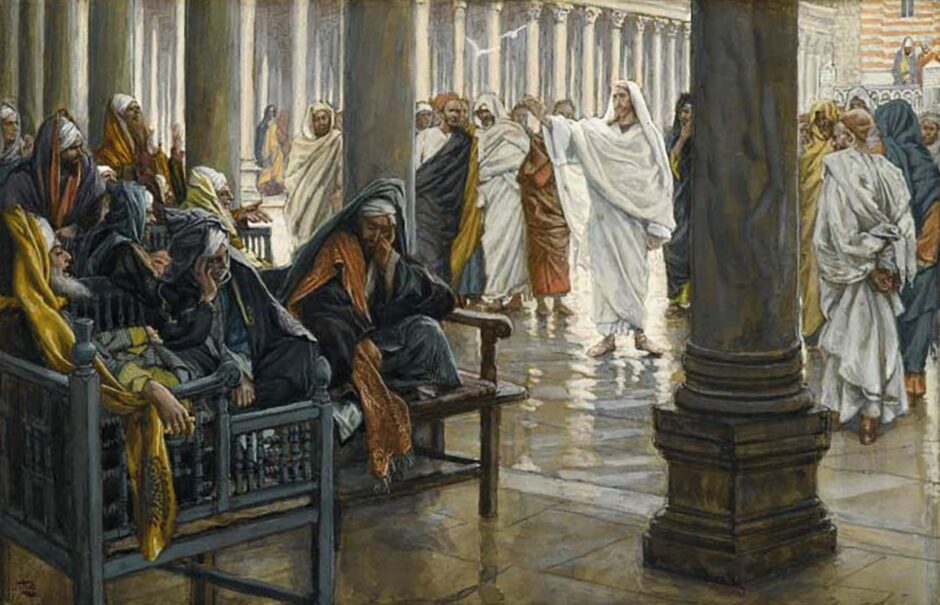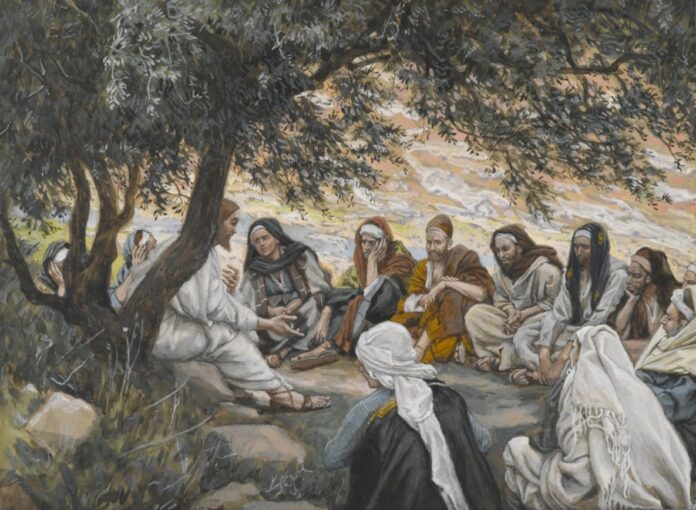WHAT is the main characteristic that should distinguish a follower of Christ?

Think of the original apostles who were his companions during his ministry. They all had very different characters. There was the impetuosity of Peter, the fiery tempers of James and John, the simple devotion of Thomas. They were all different, but they were faithful men, they were good material to work with. They needed development and training. They needed the prayers, guidance and sometimes the reproaches of their Master. He declared his love and his intention for them:
Greater love has no one than this, that someone lay down his life for his friends. You are my friends if you do what I command you. No longer do I call you servants, for the servant does not know what his master is doing; but I have called you friends, for all that I have heard from my Father I have made known to you (John 15:13–15).
In order to be his friends, they must follow his commandments. This involved self-denial, the suppression of natural impulses, the surrender of their worldly ambitions, a genuine effort to live after the perfect example of their Master.
The Need to Strive
In his teaching the Lord repeatedly stressed the need for an active personal commitment. What makes a good disciple is not saying “Lord, Lord!” but doing the will of God (Matthew 7:21). It is to hunger after righteousness, to be merciful and pure in heart, to be peacemakers, to be prepared to be persecuted for the sake of their faith (Matthew 5:6–11). It is to choose the path which is right, even though it may be difficult.
Strive to enter through the narrow door. For many, I tell you, will seek to enter and will not be able (Luke 13:24).
That word “strive” is connected to the Greek word from which we get our word “agony”. It means that our seeking for the Kingdom of God should be as strenuous, as determined and with as much effort as that of the athlete who agonises in the final effort to win the race.
Some suggest that “Jesus has done it all”. He has paid the price for our sins, and all we have to do is accept him as our saviour and we will be saved. That is not what the Bible says. It is true that we cannot earn salvation by our own efforts, we are entirely dependent on God’s grace: ‘For God has consigned all to disobedience, that he may have mercy on all’ (Romans 11:32). But we need to make the effort ourselves:
Work out your own salvation with fear and trembling (Philippians 2:12).
To those who by patience in well-doing seek for glory and honour and immortality, he will give eternal life (Romans 2:7).
For the one who sows to his own flesh will from the flesh reap corruption, but the one who sows to the Spirit will from the Spirit reap eternal life (Galatians 6:8).
The book of Revelation opens with a series of letters written by Jesus Christ to seven congregations of believers in Asia (Revelation chapters 2 & 3). He has a specific message to each one, but to each he holds out the promise of the reward to ‘the one who conquers’. That word ‘conquer’ means to be victorious in a conflict. Jesus’ followers are involved in a conflict with their sin-prone human nature, just as he was.
The one who conquers, I will grant him to sit with me on my throne, as I also conquered and sat down with my Father on his throne’ (Revelation 3:21).
It is not a battle we can win by our own efforts, but if we strive for the victory Christ will allow us to share in his.
Intention and Achievement
There is a great contrast between the way of life that is natural to us and the way of Christ to which we are called. Discipleship is not just a case of curbing the grosser desires of the flesh. We must address the more subtle faults of mind and spirit—pride, anger, selfishness, selfish ambition, envy, resentment when injured or criticised. But more than this, discipleship calls for a complete change in the direction of our thought. A disciple needs to live as in the presence of God. The Lord Jesus said, ‘My food is to do the will of him who sent me and to accomplish his work’ (John 4:34).
It is sometimes suggested that the way is more difficult in our day and age than it was in the First Century, because we have so many more human inventions to distract us from our discipleship. If we fail, however, it is not often the result of modern inventions. It is more usually the old, well-known enemies that pull us down—‘the desires of the flesh and the desires of the eyes and pride in possessions’ (1 John 2:16).
Jesus imposed a test of discipleship upon his disciples. ‘A new commandment I give to you, that you love one another: just as I have loved you, you also are to love one another’ (John 13:34). He showed the extent of his love by giving his life for us, and he calls us to show this love to each other. It is relatively easy to show love to those who are lovable; it is not at all easy to show it to those who are not. But if we can begin to understand our own faults, and so to appreciate the miracle of Christ loving us, we can begin to follow his example.
The Judgement
After we have noted all these exhortations to righteousness, there is still another factor of supreme importance in the call to discipleship. It is the fact that this life we live now is a preparation for the future.
You are no longer strangers and aliens, but you are fellow citizens with the saints and members of the household of God, built on the foundation of the apostles and prophets, Christ Jesus himself being the cornerstone, in whom the whole structure, being joined together, grows into a holy temple in the Lord. In him you also are being built together into a dwelling place for God by the Spirit (Ephesians 2:19–22).

Those who follow Christ are being shaped and prepared for assembly into a spiritual dwelling-place for God. The community of believers now is that dwelling-place, but it will be fully realised when Christ returns to establish his Kingdom, to take to himself those who are his and bestow upon them eternal life (Matthew 25:21). We must ask ourselves how well we are allowing him to shape us.
If we have heartily and eagerly accepted the revealed truth and have made an honest struggle toward the Christian ideal, Christ will help us, for ‘he is able to save to the uttermost those who draw near to God through him’ (Hebrews 7:25). When he returns, some will be chosen and some will be rejected (Matthew 25:31–46). The one who has opened the way to the Kingdom, and who is himself the door of life (John 10:9), will easily decide who are such true disciples that they should be welcomed to spend eternity with him.
Christ In Us
This brings us to a final thought, which is put forward repeatedly in John’s Gospel record. It may be suggested that it is the profoundest thought ever put before the human mind, expressed in the simplest of words: ‘Abide in me, and I in you’ (John 15:4).
There is an expression which the New Testament uses to describe those who have accepted Christ as Lord and Master, been baptised into his name, and continue in his commandments: they are ‘in Christ’ (for example Romans 8:1). The expression is easily understood.
The question whether Christ is in us is more searching and difficult. It is not a mere figure of speech. The phrase represents a tremendous reality, for just as material food is absorbed into the body, so thought is absorbed into the mind. Character and personality are of far greater importance than bodily strength. It is the personal character of which we think when we speak of friends whom we love.
For the disciple, Christ should be the dominating influence of our life. His teaching should be our guide, and thoughts of him are ever with us. When we are familiar with him, through our reading of his life and words, we know him as our constant companion, helping us to overcome in the struggle of life. A glance of reproach from him is more potent than the most furious rebuke from anyone else; a word of encouragement from him more helpful than the kindest efforts of all other friends.
When Christ is truly in us he can cast out all that is unworthy, develop all that is fit to endure, and effect in us a transformation of character:
We all, with unveiled face, beholding the glory of the Lord, are being transformed into the same image from one degree of glory to another (2 Corinthians 3:18).
Then when he returns to take us to himself, he will complete the process of transformation:
For this perishable body must put on the imperishable, and this mortal body must put on immortality. When the perishable puts on the imperishable, and the mortal puts on immortality, then shall come to pass the saying that is written: “Death is swallowed up in victory” (1 Corinthians 15:53–54).
If Christ is in us we shall be his disciples indeed, both now and for ever.
Islip Collyer


